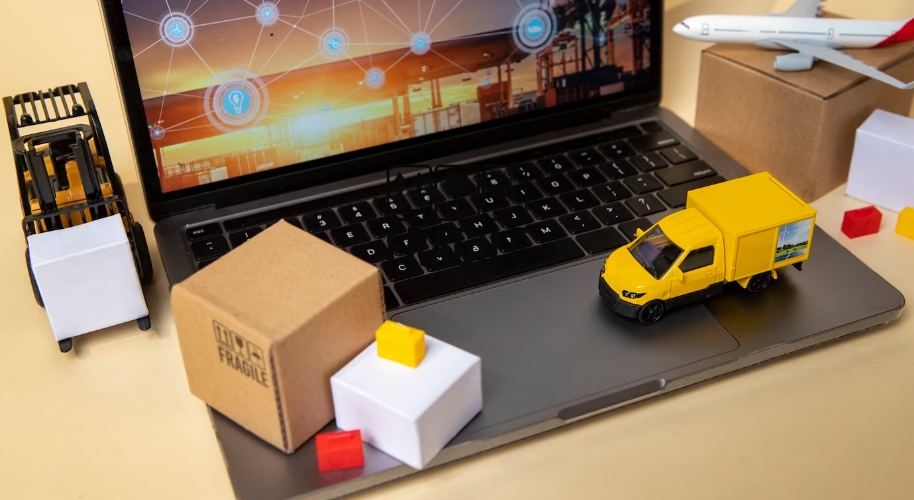-
Freight Tracking and Visibility
Businesses can track their shipments in real-time with the FMS and receive comprehensive details about each cargo's location, status, and anticipated delivery date.
-
Carrier Management
Including contract administration, carrier selection, and rate negotiation, the FMS aids firms in managing their interactions with carriers and freight forwarders.
-
Transportation Planning and Optimization
To cut costs, boost efficiency, and satisfy consumer requests, businesses may plan and optimize their transportation schedules, modes, and routes with the help of the FMS.
-
Inventory Management
The FMS enables companies to control inventory levels, monitor stock movement, and enhance distribution and storage.
-
Invoicing and Billing
The FMS streamlines the payment process and reduces errors by automating billing and invoicing.
-
Analytics and Reporting
The FMS offers companies real-time data and analytics to aid decision-making, trend identification, and operational optimization.
In general, cloud computing solutions can assist firms in streamlining their logistical processes while enhancing visibility, control, and efficiency.
Dev Technosys offers expert dedicated developers under a flexible Time and Material model to turn your vision into powerful, scalable digital solutions
Effective goods management systems are now crucial for organizations of all sizes as the globe becomes more connected. In this guide, we'll review everything you need to know to create a freight management system to help you organize your logistical processes and boost your revenue.
The primary components of a freight management system, such as real-time tracking, automated reporting, and carrier management, will be discussed first. The technical aspects of creating a system from scratch will include picking the best technology stack and creating a user-friendly interface. In addition, we'll offer advice on how to test, implement, and manage your system, as well as insights into industry best practices and recent developments.
Whether you're a logistics professional looking to build a custom solution or a software development company interested in the freight management space, this guide will provide you with the knowledge and tools you need to succeed.
What is Freight Management System?
A Freight Management System (FMS) is a software platform that aids in the management and optimization of freight transportation operations for shippers and logistics service providers. Freight management solutions offer a centralized platform for managing every shipping process step, including choosing the carrier, organizing the load, scheduling, tracking, billing, and reporting.
FMS can integrate with Enterprise Resource Planning (ERP), Warehouse Management Systems (WMS), and Transportation Management Systems (TMS) to enable comprehensive oversight and regulation of the entire supply chain. This integration ensures end-to-end visibility and control.
Increased productivity, lower transportation costs, better customer service, and greater visibility and control over the supply chain are all advantages of a goods management system. Shippers and logistics providers can also benefit from FMS analytics and reporting capabilities to identify and optimize areas for improvement.
Features of Freight Management System
A freight management system software is software that aids in managing transportation and logistics for enterprises. Depending on the business's particular requirements, an FMS's features may vary. However, some frequent ones include:
How to Build a Freight Management System?
If you work in the goods sector, you know how crucial it is to have a trustworthy and effective goods management system. You may improve efficiency, lower expenses, and streamline operations with a well-designed goods management system. To assist you in getting started, we'll go over the fundamentals of developing a goods management system from a freight management company perspective in this blog post.
-
Step 1: Define Your Requirements
Specifying your needs is the first stage in developing a goods management system. It's up to you to decide what functions and features your system must have. The following are some fundamental specifications for a goods management system:
- Managing shipments, including scheduling and tracking
- The management of shipping quotations and pricing through integration with carrier systems
- Controlling inventory and warehousing activities
- Skills for reporting and analytics
- Transportation Management System Software integration for billing and accounting
- User identification and access management
It is essential to define your requirements because they will direct the development process and guarantee that your system satisfies your business requirements.
-
Step 2: Choose a Technology Stack
The next stage is to decide which technology stack you'll employ to develop your system after you've specified your needs. Custom software development companies utilize tools and technologies called a "technology stack" to build software applications.
You'll most likely require a mix of front-end and back-end technology for a goods management system. HTML, CSS, and JavaScript are common front-end technologies, and Java, Python, and Ruby on Rails are well-liked back-end technologies.
The success of your project depends on selecting the appropriate technological stack. When selecting your choice, consider scalability, security, and usability elements.
-
Step 3: Design and Develop Your System
It's time to begin planning and creating your Fleet management software now that your requirements have been established and your technology stack has been selected. The real work starts now, and to make sure your system is created according to your specs, you'll need to collaborate closely with your development team.
There will probably be multiple stages to the development process, including:
- Wireframing and Prototyping Stage: Visual representations of your system's user interface and functionality are created during the wireframing and prototyping stage.
- Front-end Development: This phase entails creating your system's user-facing components, like the website or mobile app.
- Back-end Development: This phase entails creating your system's server-side elements, such as the database and APIs.
- Integration and testing: This phase entails integrating every component of your system and testing each one to ensure it functions properly.
- Deployment: In this phase, your system is launched and made accessible to users.
Maintaining continuous communication with your development team throughout the process is crucial to ensure everyone is on the same page and that the project is going according to schedule.
-
Step 4: Monitor and Maintain Your System
Your effort isn't finished once your goods management system is operational. To ensure that your system is operating as planned and to deal with any problems that may develop, you must regularly monitor it.
-
Step 5: Monitoring your system might involve:
- Scanning the server logs for faults or poor performance
- Tracking user behavior to find areas for development
- Performing routine backups to safeguard the security of your data
- Additionally, you'll need to keep your system current and improved over time.
It could entail incorporating fresh features, enhancing functionality, or fixing travel app development security issues.
Benefits of Freight Management System
A Freight Management System (FMS) is a software solution designed to streamline and optimize freight transportation operations for businesses. Here are some of the benefits that a Freight Management System can provide:
-
Improved Visibility
Businesses can be aware of their freight movements thanks to real-time tracking capabilities offered by freight management systems.It enables businesses to become more productive and to make informed choices regarding their supply chain management.
-
Cost Savings
With modern freight software development, routes and modes of transportation may be optimized, cutting costs and lowering the likelihood of delays and damage. Additionally, it lowers administrative costs by streamlining the billing and payment processes.
-
Time Savings
FMS automates several manual procedures, including scheduling, data input, and paperwork, which saves time and effort while managing freight operations. Businesses can then concentrate on other crucial duties and increase overall production.
-
Better Customer Service
Businesses may give consumers precise and timely information about the status of their shipments using FMS. It builds consumer loyalty and increases customer happiness.
-
Enhanced Data Analytics
Businesses can utilize FMS to get insightful data and analytics to help them decide how to run their supply chains. It can improve planning and forecasting, help identify areas for improvement, and boost operational effectiveness.
Overall, putting a good management system in place can benefit companies by lowering costs, saving time, enhancing customer service, and optimizing their supply chain operations.
How Much Does It Cost To Develop Freight Management System?
Several variables, including the system's complexity, the functionality required, the technology stack employed, the size of the development team, and the development duration, can significantly impact the cost of establishing a goods management system.
A fundamental goods management system with necessary functionality costs $10,000 to $50,000. But a more sophisticated system with cutting-edge capabilities like real-time tracking, predictive analytics, and automated software development costs $30,000 and $66,000.
It's vital to remember that these are only estimates and that the price may change depending on the project's particulars. For a more precise estimation based on your unique requirements, it's advisable to seek the guidance of a software development firm or a group of developers.
How to Hire a Freight Management Company to Build a Freight Management System?
It can be a wise business move to work with a freight management company to create a freight management system. You may improve logistics management, decrease expenses, and streamline shipping operations with a good goods management system. Following these steps will help you develop a goods management system after employing a goods management business:
-
Determine the needs of your business
It would help if you ascertained your business needs for the system before seeking a goods management provider. It includes any particular integrations and services you need, such as carrier management, shipment tracking, and billing.
-
Research freight management companies
To choose a reputable goods management company, look for one with knowledge of creating specialized goods management systems. You can identify firms by searching online directories or asking other companies in your sector for recommendations.
-
Analyze the company's experience
To ensure the organization has the knowledge necessary to suit your business requirements, inquire about its experience developing similar systems. To learn more about their history, request case studies or client testimonials.
-
Establish the project's budget and schedule
Your project's budget and timetable should be discussed with the goods management business. Make sure they can deliver the system on schedule and within your budget.
-
Complete the agreement
Complete the contract after choosing a goods management business. Make sure that it contains all of the features, deadlines, and budgets that were agreed upon.
-
Collaborate with the company
Work closely with the goods management firm during development to ensure the system satisfies your needs. Regularly provide feedback, and make sure any problems are quickly resolved.
Following these steps, you can employ a Logistics Management Software company to develop a freight management system that satisfies your business needs and enhances your logistics operations.
How Can Dev Technosys Help You?
Dev Technosys is an application development company specializing in developing cutting-edge web applications for small and large businesses in various industries. Our team's main mission is to develop web-based applications that are easy to use, simple to operate, and aligned with organizational goals. Dev Technosys has years of experience integrating cutting-edge technologies on various technological frameworks, such as JavaScript, jQuery, AngularJS, Ruby on Rails, PHP, HTML5, etc.
We are an ISO 9001:2015 certified web and mobile app development company with over ten years of experience in the IT industry. We have helped several startups, mid-level businesses, and international brands by considering their project requirements. Durability, privacy, and sustainability are considered when our qualified team develops a project.
Our services include the following features:
-
A Talented Development, Web Development, And Project Management Team.
-
Non-Disclosure Contract (NDA)
-
Dependable Data Security And Privacy Mechanisms
-
Improved Project Management With Cutting-Edge Tools
-
Most Recent Technology & Stack Development
-
After-Release Assistance Maintenance Services For Apps
With A Tonne More.
In that case, you can discuss hiring freight management services with us. Based on your requirements, we can provide you with a cost estimation.

















